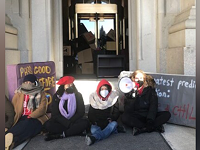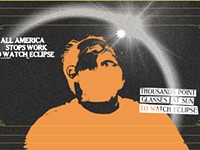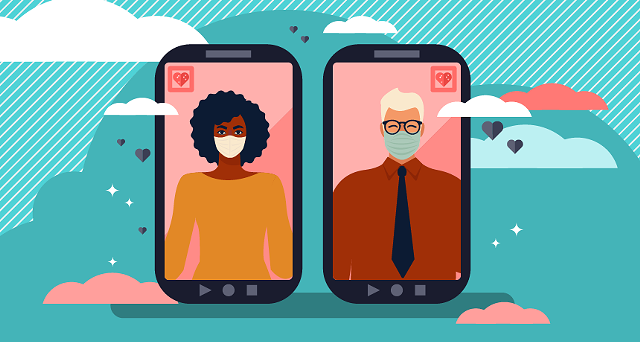[
{
"name": "500x250 Ad",
"insertPoint": "5",
"component": "15667920",
"parentWrapperClass": "",
"requiredCountToDisplay": "1"
}
]
For those who follow my work here at CITY, you might be aware I’m single, and quite happily so.
Still, I keep my foot in the dating pool, and begrudgingly take to apps like Tinder and Bumble to meet people. But in the age of coronavirus, the screen-to-screen connection is all these apps have to offer.
In fact, both Tinder and Bumble have taken an official stance on this, advising users not to meet any matches in person. The apps had previously advised a social distancing radius of six feet, which was already unfulfilling enough.
“We hope to be a place for connection during this challenging time, but it's important to stress that now is not the time to meet in real life with your match,” a message from Tinder this week read. “Please keep things here for now."
Hanna Vergo, a friend of mine, went on a socially-distanced Tinder date last week. Vergo and her date, a man whose name CITY has agreed to not publish at his request, went for a walk six feet apart from one another.
“I feel like even that isn’t enough to really meet a person,” Vergo said.
Let’s not negate the value of simple human contact in our pursuit of love.
Consider a 2012 study in the journal Psychosomatic Medicine, in which 20 men in heterosexual relationships were subjected to electric shocks while their female partners underwent an MRI. Researchers found that in those women who reached out to touch their men to comfort them, the regions of their brains associated with maternal instincts and managing fear were activated.
In other words, a reassuring physical gesture was shown to have a positive effect on a person’s brain. Sex is not the only factor here — a simple touch has profound value.
Vergo is one of my only friends still in the dating pool and actively using Tinder. While she enjoys using the app more than me, we’re both now stuck with the reality that online dating is, well, strictly online for now.
“It’s weird, why would you even keep talking to people if you never can meet them?” Vergo said.
Perhaps. But it raises the question of whether you can ever truly know a person without meeting them in person?
Many Americans say no. A recent Pew Research study found a whopping 71 percent of adults that have used dating apps believe it is extremely common for other users to lie.
We all have heard catfishing horror stories. But imagine diligently and in good faith building a virtual relationship with a person through an entire pandemic, just to find that, come when life returns to a semblance of normalcy, they aren’t who they seemed.
This is a dreary reality that many in the dating scene fear we may have to face.
While also being one of the few people I know still using dating apps, Vergo is also among a small handful of younger people I know that prefers phone calls over texting. While it’s not the same as physical contact, the timbre of a voice and a person’s verbal mannerisms can offer more insight into a person.
Bumble, an app which, for straight users, requires women to send the first message, embraced that idea last year, adding video and voice chat features. The app is now encouraging those choices over meeting in person due to COVID-19.
Maybe when the dust settles from this pandemic, we will keep some lessons on personability, on learning how to connect better with the person behind the screen.
“Honestly, I hope there’s a lot of things that stick with how we interact with each other when this is all over,” Vergo said.
Still, I keep my foot in the dating pool, and begrudgingly take to apps like Tinder and Bumble to meet people. But in the age of coronavirus, the screen-to-screen connection is all these apps have to offer.
In fact, both Tinder and Bumble have taken an official stance on this, advising users not to meet any matches in person. The apps had previously advised a social distancing radius of six feet, which was already unfulfilling enough.
“We hope to be a place for connection during this challenging time, but it's important to stress that now is not the time to meet in real life with your match,” a message from Tinder this week read. “Please keep things here for now."
Hanna Vergo, a friend of mine, went on a socially-distanced Tinder date last week. Vergo and her date, a man whose name CITY has agreed to not publish at his request, went for a walk six feet apart from one another.
“I feel like even that isn’t enough to really meet a person,” Vergo said.
Let’s not negate the value of simple human contact in our pursuit of love.
Consider a 2012 study in the journal Psychosomatic Medicine, in which 20 men in heterosexual relationships were subjected to electric shocks while their female partners underwent an MRI. Researchers found that in those women who reached out to touch their men to comfort them, the regions of their brains associated with maternal instincts and managing fear were activated.
In other words, a reassuring physical gesture was shown to have a positive effect on a person’s brain. Sex is not the only factor here — a simple touch has profound value.
Vergo is one of my only friends still in the dating pool and actively using Tinder. While she enjoys using the app more than me, we’re both now stuck with the reality that online dating is, well, strictly online for now.
“It’s weird, why would you even keep talking to people if you never can meet them?” Vergo said.
Perhaps. But it raises the question of whether you can ever truly know a person without meeting them in person?
Many Americans say no. A recent Pew Research study found a whopping 71 percent of adults that have used dating apps believe it is extremely common for other users to lie.
We all have heard catfishing horror stories. But imagine diligently and in good faith building a virtual relationship with a person through an entire pandemic, just to find that, come when life returns to a semblance of normalcy, they aren’t who they seemed.
This is a dreary reality that many in the dating scene fear we may have to face.
While also being one of the few people I know still using dating apps, Vergo is also among a small handful of younger people I know that prefers phone calls over texting. While it’s not the same as physical contact, the timbre of a voice and a person’s verbal mannerisms can offer more insight into a person.
Bumble, an app which, for straight users, requires women to send the first message, embraced that idea last year, adding video and voice chat features. The app is now encouraging those choices over meeting in person due to COVID-19.
Maybe when the dust settles from this pandemic, we will keep some lessons on personability, on learning how to connect better with the person behind the screen.
“Honestly, I hope there’s a lot of things that stick with how we interact with each other when this is all over,” Vergo said.
Gino Fanelli is a CITY staff writer. He can be reached at [email protected].
Speaking of...
-

Mask mandate for New York schools to end Wednesday
Feb 28, 2022 -

Hochul confirms state's eviction moratorium ends Jan. 15
Jan 12, 2022 -

Hochul: COVID-19 winter surge is here
Dec 17, 2021 - More »
Latest in Culture
More by Gino Fanelli
-

DeWolf Brewing Company set to open in Victor
Apr 26, 2024 -

These small cannabis farmers say New York's legal weed rollout is ruining their lives
Mar 21, 2024 -

Man shakes fist at sun
Mar 15, 2024 - More »



